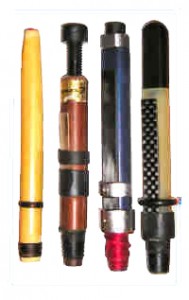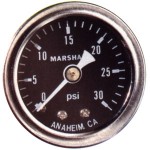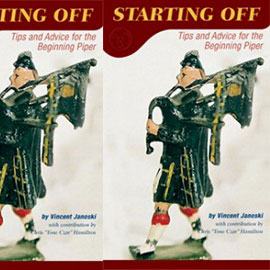Tips to Get the Most Out of Your Drone Reeds
 Whether we’re playing the new-fangled techno-reed, or we’re old-school and we play cane, here are some tips to make sure you’re getting the most out of your drone reeds:
Whether we’re playing the new-fangled techno-reed, or we’re old-school and we play cane, here are some tips to make sure you’re getting the most out of your drone reeds:
1) Make sure your drone reeds are seated firmly in the reed seat.
This may seem like a no brainer, but if your reeds aren’t seated tightly in the reed seat, a variety of problems can occur: They could fall into the bag. They’ll probably be considerably less steady. Your pipes will be harder to blow. The loose reed will likely take on moisture sooner.
Here is what you do:
a) used waxed hemp, to get the tightest seal possible with the reed seat.
b) Make sure you have a lifeline. A lifeline is about an inch of excess hemp that will stick in the area where the drone meets the stock. That way, if the reed does come loose, it’ll just dangle instead of falling in the bag!
c) another option is to THREAD your drone reed seats. The idea of threading is that the drones (which are still hemped with waxed hemp) “screw” into the reed-seats, making it virtually impossible for the reeds to fall out. Most piping shops and pipe makers can help you with this project, if you’re interested.
2) Calibrate your reeds to suit the strength of your reed.
This is essential. Many times, we see students come in with reeds that are all taking different amounts of air, and all taking too much air relative to the strength of their reed. The result is a really loud, unsteady, un-tunable drone sound!
Here’s how we suggest you calibrate your drone reeds.
First, cork off your bass and a tenor. Play Low A on your chanter with one drone going. Your drone reed should shut off when you blow too hard on your chanter. Gradually increase your blowing pressure until you know you’re blowing too hard. Does the reed shut off? It should.
Here’s why: If your drone reed shuts off when you blow too hard on your chanter, you know it’s taking the minimum amount of air necessary when you’re blowing normally. This is essential in trying to acheive an efficient bagpipe!
If your drone doesn’t shut off, adjust the bridal on the drone reed down, towards the end of the tongue. Most synthetic reeds will only need the slightest adjustment (too much and the reed won’t sound at all). If, by chance, your reed is shutting off too soon, adjust the bridal away from the tip of the tongue. [if you aren’t sure how to do this, be sure to have a teacher show you a couple of times. Reeds are expensive, so you need to be careful not to damage them in the process of adjusting the bridals]
Ok, now that the first reed is calibrated, our objective is going to be to calibrate the other two drone reeds to the same strength of the first.
I would cork off the chanter, and then open up a second drone. Now, we’ll gradually increase the pressure in the bag, in hopes that the two drones will shut off at exactly the same pressure.
Do they? If the “new” (recently opened) drone shuts off later than the first, you’ll need to close it down a bit, by moving the bridal towards the tip of the tongue. If it shuts off too early, move the bridal away from the tip of the tongue. When they shut off at exactly the same pressure, then move on to the third drone and perform the same task.
The reason we want them to shut off at the same time is this: Obviously, the principle from above still applies – if all the drone reeds shut off when you blow too hard, that means when you blow normally, the reeds are taking the minimum amount of air. Now, we add in the extra step – if the drone reeds are all taking the SAME amount of air, that means they will all react the SAME to changes in blowing. They’ll be steadier, stay in tune, and take on the same amount of moisture. Try it! It really works!
After this process, your pipes are guaranteed to be as efficient as possible, and they’ll be more stable as well!
3) Keep moisture off the reeds!
This is especially important with most synthetic reeds. Condensation on the tongue makes the reeds vibrate unpredictably. Whenever a droplet moves on the tongue, your drones will go out of tune.
This is an extremely in-depth topic, but consider a few simple strategies:
a) Make sure your bag is seasoned properly. Seasoning helps subdue moisture issues in the bag
b) If you play a moisture-control system like a canister bag, make sure the “rocks” are dry.
c) About ten minutes before a performance, check the reeds for condensation. If there’s a lot, wipe it off, then minimize the amount of air you put through them before you have to perform.
d) Avoid cold environments. Even a few moments in a cold space could cause moisture in your bag to condense!!! On the same note, be aware that the colder the environment, the more moisture you’ll have forming on your reeds!
-
electric guitars
 Pipehacker
Pipehacker






